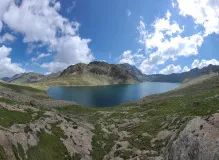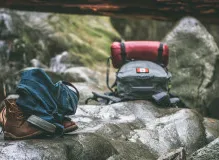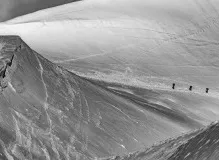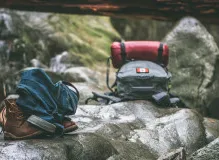For over long years, we have diligently conducted independent research and product testing. When you make a purchase through our links, we may earn a commission.
Does Trekking Help with Weight Loss? Find Out Now!
Created: 1 week ago

18 min Read
Introduction
Trekking, a popular activity for adventure enthusiasts and nature lovers, has gained significant attention for its potential impact on weight loss. Many individuals embark on trekking journeys not only to appreciate the beauty of nature but also with the hopes of shedding excess weight. But does trekking really help reduce weight? In this blog post, we will explore the effects of trekking on weight loss and examine the factors that contribute to its effectiveness as a fitness activity. So, lace up your boots and join us as we embark on this informative trek into the world of weight loss through trekking! 🏔️✨
The Benefits of Trekking for Weight Loss
Trekking is not only a thrilling adventure but also a fantastic form of exercise that can contribute to weight loss. Here are some of the key benefits of trekking for shedding those extra pounds:
-
Burns Calories: Trekking involves traversing various terrains, which requires physical exertion and burns calories. The inclines, declines, and uneven surfaces encountered during a trek engage multiple muscle groups, leading to increased energy expenditure.
-
Cardiovascular Workout: Trekking is an excellent cardiovascular exercise that gets your heart pumping. The continuous movement and varying intensity levels during a trek help improve heart health and increase overall fitness.
-
Increases Metabolic Rate: Trekking is known to boost your metabolic rate, which means you continue to burn calories even after the trek is over. This prolonged effect can aid weight loss by increasing the number of calories burned throughout the day.
-
Builds Muscle Strength: Trekking requires core stability and leg strength to navigate through different terrains. Regular trekking can help strengthen muscles, enhance endurance, and tone your body.
-
Reduces Stress: Stress plays a significant role in weight gain and difficulty in losing weight. Trekking provides an opportunity to disconnect from the daily stresses of life and immerse oneself in the serenity of nature, promoting mental well-being and reducing stress levels.
Factors that Influence Weight Loss through Trekking
While trekking can be an effective tool for weight loss, several factors can influence its effectiveness for each individual. Here are some important considerations:
-
Intensity and Duration: The intensity and duration of your trekking expedition determine the number of calories burned. Longer and more challenging treks tend to have a greater impact on weight loss.
-
Terrain Difficulty: Trekking on steep inclines or rough terrains requires more effort and engages more muscles. Opting for challenging routes can contribute to increased weight loss.
-
Body Weight and Fitness Level: Your current body weight and overall fitness level play a role in how much weight you can expect to lose through trekking. Individuals with higher body weight tend to burn more calories compared to those with lower body weight.
-
Nutrition and Hydration: While trekking, it is essential to maintain a balanced diet and stay hydrated to support your weight loss goals. Proper nutrition and hydration provide the necessary energy and support recovery after a rigorous trek.
Conclusion
Trekking can be a highly effective activity for weight loss, offering a combination of physical exercise, mental rejuvenation, and an opportunity to connect with nature. However, it is important to remember that weight loss is a holistic process, and the effectiveness of trekking will vary for each individual. It is always recommended to consult with a healthcare professional or fitness expert before embarking on a trekking journey to ensure that it aligns with your specific goals and health conditions. So, why not tie up those hiking boots and explore the stunning trails while working towards your weight loss goals? Happy trekking! 🚶♀️🌲
Benefits of Trekking for Weight Loss
Trekking, a thrilling adventure that takes you off the beaten path and into the heart of nature, offers numerous benefits for weight loss. Let's explore how trekking can help you shed those extra pounds and achieve your fitness goals.
-
Burns Calories: Trekking involves continuous physical activity, such as walking uphill, navigating uneven terrains, and carrying a backpack. These activities require significant energy expenditure, leading to calorie burning and weight loss.
-
Cardiovascular Workout: Trekking is a fantastic cardiovascular exercise that gets your heart pumping and improves overall cardiovascular health. The long, sustained walks, combined with the varying intensity levels, provide an excellent workout for your heart and lungs.
-
Boosts Metabolism: Trekking elevates your metabolic rate during the activity and even after you have finished your trek. This means your body continues to burn calories at a higher rate, helping you to burn fat and lose weight more effectively.
-
Builds Muscle Strength: Trekking involves traversing different terrains, which engages various muscle groups in your body. Uphill climbs work your leg muscles, while navigating through rugged trails strengthens your core and upper body. Regular trekking can lead to improved muscle tone, increased strength, and enhanced endurance.
-
Reduces Stress: Stress is often a contributing factor to weight gain and difficulty in losing weight. Trekking provides an escape from the daily grind and allows you to immerse yourself in the tranquility of nature. The serene surroundings and fresh air help reduce stress levels, improve mental well-being, and promote weight loss.
Remember to consult with a healthcare professional before embarking on any new exercise regimen, especially if you have any underlying health concerns or medical conditions.
Factors Affecting Weight Loss through Trekking
Several factors influence the effectiveness of trekking for weight loss. Understanding these factors can help you optimize your trekking experience for maximum results.
-
Intensity and Duration: The intensity and duration of your trekking expedition play a crucial role in the number of calories burned. Longer treks and those with more challenging terrains require more effort and result in higher calorie expenditure.
-
Terrain Difficulty: Trekking on steep inclines, rocky surfaces, or uneven terrains requires more energy and engages more muscles. Opting for challenging routes can enhance the effectiveness of trekking for weight loss.
-
Body Weight and Fitness Level: Your current body weight and fitness level impact the amount of weight you can expect to lose through trekking. Individuals with higher body weight tend to burn more calories compared to those with lower body weight. However, trekking can be tailored to accommodate different fitness levels.
-
Nutrition and Hydration: Proper nutrition and hydration are key factors in supporting your weight loss goals during trekking. Ensure you have a balanced diet with sufficient nutrients to fuel your body. Stay hydrated by drinking plenty of water throughout your trek to maintain optimal performance and aid in recovery.
By considering these factors and customizing your trekking experience, you can maximize the weight loss benefits while enjoying the beauty of the great outdoors.
🚶♂️🌄
Pro Tips for Effective Weight Loss Trekking
To make the most of your trekking journey for weight loss, here are some pro tips to keep in mind:
-
Gradually Increase Difficulty: Start with moderate treks and gradually progress to more challenging ones. This helps avoid injuries and allows your body to adapt to the physical demands of trekking.
-
Mix Up Intensity: Alternate between high-intensity and low-intensity trekking to challenge your body and keep your metabolism stimulated.
-
Incorporate Strength Training: Supplement your trekking with strength training exercises to build additional muscle mass, as muscle burns more calories at rest.
-
Maintain a Balanced Diet: Consume a well-balanced diet rich in nutrients, including lean proteins, whole grains, fruits, and vegetables. Avoid excessive calorie consumption to ensure a calorie deficit for weight loss.
-
Track Your Progress: Keep a record of your treks, distances covered, and calories burned to monitor your progress and stay motivated. You can use fitness apps or wearable devices to help track your metrics.
Remember, consistency is key in any weight loss journey. Stay committed to your trekking routine, listen to your body, and enjoy the incredible benefits that trekking has to offer.
Comparison Chart: Trekking vs Other Weight Loss Activities
To help you understand how trekking stacks up against other weight loss activities, here's a comparison chart:
| Factors | Trekking | Running | Cycling | Swimming |
|---|---|---|---|---|
| Calorie Burn | Moderate-High | High | Moderate | High |
| Impact on Joints | Low | High | Low | Low |
| Full Body Workout | Yes | Yes | No | Yes |
| Cardiovascular Benefits | Yes | Yes | Yes | Yes |
| Outdoor Experience | Yes | No | No | No |
Keep in mind that the number of calories burned and the effectiveness of each activity may vary depending on intensity, duration, and individual factors.
🥾🏃♂️🚴♀️🏊♀️
In conclusion, trekking can be a highly effective activity for weight loss due to its calorie-burning potential, cardiovascular benefits, muscle-building effects, and stress-reducing properties. By considering the factors that influence weight loss during trekking and following the pro tips provided, you can optimize your trekking experience for successful weight loss. So, put on your hiking boots, explore the great outdoors, and embark on a trekking journey to achieve your fitness goals. Happy trails! 🌲🌿
Physical Effects of Trekking on the Body
Trekking is not only a thrilling adventure but also a fantastic form of exercise that can contribute to weight loss. Many individuals wonder, "Does trekking reduce weight?" Let's explore the physical effects of trekking on the body and how it can play a role in shedding those extra pounds.
Burns Calories: Trekking involves traversing various terrains, which requires physical exertion and burns calories. The inclines, declines, and uneven surfaces encountered during a trek engage multiple muscle groups, leading to increased energy expenditure. Trekking for extended periods at a moderate to high intensity can result in significant calorie burn, aiding in weight loss.
Cardiovascular Workout: Trekking is an excellent cardiovascular exercise that gets your heart pumping. The continuous movement and varying intensity levels during a trek help improve heart health and increase overall fitness. The sustained effort involved in trekking strengthens the heart muscles, improves blood circulation, and enhances lung capacity.
Increases Metabolic Rate: Trekking is known to boost your metabolic rate, which means you continue to burn calories even after the trek is over. This prolonged effect can aid weight loss by increasing the number of calories burned throughout the day. Regular trekking sessions can help rev up your metabolism, making it easier to achieve and maintain a healthy weight.
Builds Muscle Strength: Trekking requires core stability and leg strength to navigate through different terrains. As you hike through mountains, forests, or other natural landscapes, your muscles work hard to maintain balance and propel your body forward. This constant use of muscles can help strengthen them, enhance endurance, and contribute to a toned physique.
Reduces Stress: Stress plays a significant role in weight gain and difficulty in losing weight. Trekking provides an opportunity to disconnect from the daily stresses of life and immerse oneself in the serenity of nature, promoting mental well-being and reducing stress levels. The combination of physical activity and exposure to nature can have a positive impact on mental health, leading to a better overall sense of well-being.
In conclusion, trekking can have a positive impact on weight loss due to its calorie-burning effects, cardiovascular benefits, increased metabolic rate, and muscle-building properties. Additionally, the reduction in stress levels can contribute to a healthier mindset and overall weight management. Incorporating regular trekking sessions into your fitness routine can be an enjoyable and effective way to achieve your weight loss goals while immersing yourself in the beauty of nature. So, pack your bags, put on your hiking boots, and start trekking towards a healthier and fitter you! 🥾🌄
Mental Effects of Trekking on Weight Loss
In addition to its physical benefits, trekking can have significant mental effects that contribute to weight loss. Let's explore how trekking can positively impact your mental well-being and support your weight loss journey.
1. Stress Reduction: Trekking provides a much-needed escape from the daily stresses of life, allowing you to disconnect from technology and immerse yourself in the tranquility of nature. The peaceful surroundings, fresh air, and calming landscapes have a soothing effect on the mind, reducing stress levels. As stress is closely linked to weight gain and difficulty in losing weight, this stress reduction can be a key factor in achieving successful weight loss through trekking.
2. Mindfulness and Mental Clarity: On a trek, you have the chance to be fully present in the moment, focusing on each step, breath, and the beauty of your surroundings. This practice of mindfulness helps quiet the mind, improve concentration, and enhance mental clarity. By honing your ability to be mindful during treks, you can develop a greater awareness of your body and its needs, making healthier choices for your overall well-being, including weight loss.
3. Boosted Mood and Happiness: Engaging in physical activity releases endorphins, the "feel-good" hormones, which can significantly boost your mood and increase feelings of happiness. Trekking for weight loss not only provides an opportunity to release these endorphins but also allows you to soak in the beauty of nature and experience a sense of accomplishment as you conquer challenging terrains. This combination of physical exertion and natural surroundings can have a profound positive effect on your mental state, motivating you to continue your weight loss journey.
4. Enhanced Self-Confidence: Trekking often involves overcoming obstacles and pushing your limits. As you tackle steep ascents, brave river crossings, and navigate through rugged terrain, you develop a sense of resilience and self-confidence. This newfound confidence extends beyond your trekking experience and can positively affect other areas of your life, including your weight loss journey. With each successful trek, your belief in your own abilities increases, empowering you to take on new challenges and stay committed to your weight loss goals.
Trekking vs Other Forms of Exercise
To better understand the effectiveness of trekking for weight loss, let's compare it to other popular forms of exercise:
| Factor | Trekking | Running | Cycling |
|---|---|---|---|
| Calorie Burn | Depends on intensity | High | Moderate to High |
| Impact on Joints | Moderate | High | Low |
| Full Body Workout | Yes | No | Lower Body Focus |
| Nature Connection | High | Low | Low |
| Mental Relaxation | Yes | Yes | Moderate |
| Variety of Terrain | Yes | No | No |
As shown in the comparison chart above, trekking offers a unique combination of physical and mental benefits that make it an excellent choice for weight loss. It provides a full-body workout, burns calories depending on intensity, and allows you to enjoy the serenity of nature while reducing stress levels. Additionally, trekking offers the opportunity to explore a variety of terrains, making it a more engaging and diverse form of exercise compared to running or cycling.
In conclusion, trekking is not only a thrilling adventure but also an effective way to support weight loss. It combines the physical benefits of calorie burn and muscle strengthening with the mental effects of stress reduction, mindfulness, and enhanced mood. By incorporating trekking into your fitness routine and considering the factors that influence weight loss, you can enjoy the physical and mental rewards of trekking while shedding those extra pounds. So, put on your hiking boots, embrace the beauty of nature, and take a step towards a healthier, fitter you! 🚶♂️🌿
Tips for Effective Weight Loss through Trekking
If you're looking to maximize your weight loss potential through trekking, here are some tips to keep in mind:
-
Choose Challenging Trails: Opt for trails that offer varying terrains and difficulty levels. Steep inclines and rough terrains require more effort and can help you burn more calories.
-
Increase Intensity: Challenge yourself by increasing the intensity of your trekking activities. Incorporate interval training by alternating between fast-paced walking and slower recovery periods.
-
Extend the Duration: Aim for longer trekking sessions to increase calorie expenditure. Gradually increase the duration of your treks to build stamina and improve endurance.
-
Pack Light: Minimize the weight of your backpack to enhance the intensity of your trek. Carrying a lighter load will require your body to work harder and burn more calories.
-
Incorporate Strength Training: Combine trekking with strength training exercises to build muscle and further boost your metabolism. Bodyweight exercises such as squats, lunges, and push-ups can be performed during rest stops along your trek.
-
Stay Consistent: Consistency is key when it comes to trekking for weight loss. Aim for regular treks at least 2-3 times a week to maintain the calorie-burning momentum and see sustainable results.
-
Fuel Your Body: Fueling your body with nutritious meals and snacks is essential for weight loss, especially during long treks. Pack lightweight, high-energy foods such as nuts, dried fruits, granola bars, and trail mix to keep your energy levels up.
-
Hydrate Adequately: Proper hydration is crucial for both performance and weight loss. Carry a sufficient amount of water and drink regularly to stay hydrated during your treks.
-
Listen to Your Body: Pay attention to your body's signals and adjust your trekking intensity accordingly. Gradually increase the difficulty of your treks, allowing your body to adapt and minimize the risk of injuries.
-
Track Your Progress: Keep a record of your treks, noting the duration, intensity, and distance covered. Monitoring your progress can help motivate you and track the impact of trekking on your weight loss journey.
By incorporating these tips into your trekking routine, you can optimize the potential for weight loss and enjoy the numerous physical and mental benefits of this exhilarating adventure activity. So lace up your boots, hit the trails, and let trekking be your path to a healthier, fitter you! 🥾💪🌿
Precautions and Safety Measures for Trekking Weight Loss
While trekking can be an enjoyable and effective way to lose weight, it is important to take certain precautions and safety measures to ensure a safe and successful trekking experience. Here are some key factors to consider:
-
Physical Fitness Assessment: Before embarking on a trekking journey for weight loss, it is crucial to assess your physical fitness level. Consult with a healthcare professional or a fitness trainer to determine if you are medically fit for trekking activities.
-
Proper Trekking Gear: Invest in high-quality trekking gear, including comfortable and sturdy footwear, breathable clothing, a backpack, trekking poles, and other necessary equipment. Wearing the right gear can help prevent injuries and enhance your overall trekking experience.
-
Hydration and Nutrition: Maintain proper hydration throughout your trek by carrying an adequate supply of water. Additionally, pack nutritious snacks and meals to sustain your energy levels and support your weight loss goals. Include foods high in protein and carbohydrates to provide the necessary fuel for your body.
-
Plan and Research: Before starting your trek, thoroughly research the trail, weather conditions, and difficulty level. Plan your trekking route, consider the duration, and ensure that it aligns with your fitness level and weight loss goals. Familiarize yourself with emergency contact information and nearby medical facilities.
-
Acclimatization: If you are trekking at high altitudes, it is essential to acclimatize properly to avoid altitude sickness. Gradually increase your altitude and give your body time to adjust to the changing conditions. Listen to your body and be aware of any symptoms such as headaches, dizziness, or nausea.
-
Trekking in Groups: It is advisable to trek with a group or at least one partner. This ensures safety in case of emergencies and provides an additional level of support and motivation. Notify someone about your trekking plans, including the route and estimated return time.
-
Listen to Your Body: Pay attention to any signs of fatigue, discomfort, or pain during your trek. Take regular breaks, stretch your muscles, and rest when needed. Pushing yourself too hard can lead to injuries or other health risks.
By following these precautions and safety measures, you can enjoy the benefits of weight loss through trekking while minimizing the risks associated with trekking activities. Remember to prioritize your safety, stay prepared, and enjoy the journey to a healthier and fitter you! 🏕️💪
Incorporating Trekking into Your Weight Loss Journey
Trekking can be a powerful addition to your weight loss journey, offering a multitude of benefits for both your physical and mental well-being. By understanding the factors that influence weight loss through trekking, you can maximize its effectiveness and make the most out of your adventures in nature.
Intensity and Duration
The intensity and duration of your trekking expedition are vital factors in determining the amount of weight you can lose. A more intense and prolonged trek will result in higher calorie burn and potential weight loss. Consider gradually increasing the difficulty and length of your treks as you build your fitness level and endurance.
Terrain Difficulty
Opting for treks with challenging terrains can amplify your weight loss efforts. Trekking on steep inclines or rugged surfaces requires more effort and engages multiple muscle groups. By tackling challenging routes, you can make each trek a powerful workout that contributes to shedding excess weight.
Body Weight and Fitness Level
Your current body weight and fitness level also play a role in how much weight you can expect to lose through trekking. Individuals with higher body weight tend to burn more calories during physical activities. Additionally, regular trekking can improve your fitness level, making future treks more effective for weight loss.
Nutrition and Hydration
While trekking, it's crucial to maintain a well-balanced diet and stay hydrated to support your weight loss goals. Proper nutrition provides the necessary energy to fuel your treks and aids in muscle recovery. Hydration is essential to keep your body functioning optimally and to prevent fatigue during your adventures.
Continuing Your Trekking Journey
Incorporating trekking into your weight loss journey offers numerous advantages beyond just shedding pounds. Immerse yourself in the beauty of nature, enjoy the physical challenges, and embrace the mental rejuvenation that trekking brings. Combine your treks with other forms of exercise and a healthy lifestyle to enhance weight loss and overall well-being.
With the right mindset, dedication, and a well-planned trekking routine, you can experience the transformative effects of this adventure activity. So put on your hiking boots, prepare your backpack, and embark on an incredible journey to a healthier, fitter, and more fulfilled self through the wonders of trekking! 🏔️✨
Remember to consult with your healthcare professional or a certified trekking guide before embarking on any new physical activity, especially if you have any underlying health conditions.
Frequently Asked Questions (FAQs)
Is trekking a good exercise for weight loss?
Yes, trekking is an excellent exercise for weight loss. It helps burn calories and promotes fat loss.
How many calories can you burn while trekking?
The number of calories burned while trekking varies depending on factors like distance, terrain, and pace. On average, you can burn 300-600 calories per hour.
Does trekking help in toning muscles?
Yes, trekking engages various muscle groups like the legs, core, and upper body. It helps in toning and strengthening these muscles.
Can trekking be suitable for beginners?
Yes, trekking can be suitable for beginners. Start with shorter and easier trails, gradually increasing the difficulty level as you build endurance.
What are the other benefits of trekking?
Apart from weight loss, trekking offers numerous benefits like improved cardiovascular health, stress reduction, enhanced mental well-being, and a chance to connect with nature.
What should I carry while trekking for weight loss?
Some essential items to carry while trekking for weight loss include proper hiking shoes, comfortable clothing, a backpack with supplies, water bottle, sunscreen, and a first aid kit.
Is trekking alone safe for weight loss purposes?
Trekking alone can be safe if you take necessary precautions. It's advisable to inform someone about your trekking plans, stick to well-marked trails, and be equipped with a map or GPS.
How often should I go for trekking to see weight loss results?
Consistency is key. Aim to go for trekking at least 2-3 times a week for noticeable weight loss results. Make sure to have rest days in between for proper recovery.
Are there any precautions to take while trekking for weight loss?
Yes, some precautions to take while trekking for weight loss include staying hydrated, wearing appropriate clothing and footwear, using sunscreen, and being aware of weather conditions.
Can trekking in different terrains have different effects on weight loss?
Yes, the terrain you trek on can affect the intensity of your workout and calorie burn. Uphill treks tend to burn more calories compared to flat or downhill treks.









